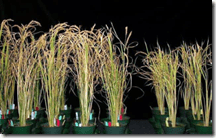 Climate change is here, folks, and I’m not saying so because it’s hot outside. This is a big worry, or at least it should be.
Climate change is here, folks, and I’m not saying so because it’s hot outside. This is a big worry, or at least it should be.
But big problems create big business opportunities: A California biotech company called Arcadia Biosciences has set out to help farmers do their part to slow down the process of global warming and adapt to a resource-constrained world–by developing crop varieties that require less water, tolerate salty conditions and use less nitrogen fertilizer.
This photo shows two varieties of rice. On the left is rice engineered for nitrogen use efficiency (NUE) by Arcadia, on the right conventional rice. In laboratory tests, using typical applications of nitrogen fertilizer, the NUE rice, as it’s known, is substantially more productive. When you can grow more food using the same inputs of land, water and fertilizer, everyone–farmers, consumers, hungry people and anyone who cares about CO2 concentrations in the earth’s atmosphere–is better off.
So, at least, says Eric Rey the founder and CEO of Arcadia. Others will disagree because Arcadia deploys genetic-engineering technology that some (many?) environmentalists oppose. But when we met last week in Washington, Eric told me that he considers himself an environmentalists and, in fact, it was his concern about disappearing species, pollution and climate issues that led him to start the company back in 2002.
The company’s purpose, Eric said, is to “use the the tools of plant biotechnology, and point them at saving the environment.” When developing a new crop variety, he said, “if we can’t put our fingers on an environmental benefit or a human health benefit, we won’t do it.”
“Agriculture has a huge environmental footprint,” he went on. “We have to optimize food production and minimize the impact of that production on the environment. I don’t think this is the only way to do it, but it’s one way and it’s valid and it’s safe.”
Arcadia got its start when Eric, who is 55 and had worked at Calgene (creator of the infamous Flavr Savr tomato) met a free-thinking, left-leaning billionaire named John Sperling, who made a fortune in the for-profit education business and since then has used his money to promote animal cloning, human life extension, legalized marijuana, saltwater agriculture and shrimp farming in Eritrea. They got to talking about how genetically-engineered crops could benefit the environment, and Sperling became (and remains) a majority shareholder of privately-held Arcadia.
Since then, the company has made considerable progress in the slow-moving world of inventing, developing, testing and gaining regulatory approval for genetically engineered crops. It has about 85 employes, most of them researchers based in Davis, Ca. (where Eric earned a degree in plant science at the state university), and it has a crop in the field–a plant known as GLA safflower oil, whose seeds contain oil with as much as 40% gamma linolenic acid that is used in supplements and nutraceutical foods. “It’s basically a broad-purpose anti-inflammatory,” Eric said.
Its work on crops that use nitrogen efficiently could have a much broader impact. Nitrogen fertilizers generate about $60 billion in worldwide revenues, Eric said: “Nitrogen is the fuel of global agriculture.” Many farmers spend more on fertilizer than they do on seeds, so crops requiring less nitrogen can save them money. That’s the business case for developing NUE crops. “It’s kind of like a hybrid car of crops,” Eric said. “You can go just as far on half a tank of gas.”
Environmental benefits arise because much of the nitrogen now spread on fields is wasted. Some of it flows into rivers and streams and eventually causes algae blooms that create notorious “dead zones” in places like the Gulf of Mexico, and a small amount (estimated at 1-6%) is converted into nitrous oxide, a potent greenhouse gas, and released into the air.
Nitrogen-efficient crops could, in theory, be eligible for carbon credits if it can be shown that they reduce greenhouse gas emissions. Arcadia has an agreement with a provincial government in China to make its seeds available for free, in exchange for the right to sell carbon credits. “The carbon piece is very important to us,” Eric says.
Arcadia is primarily an R&D company–it identifies technologies, brings them closer to commercial application, takes them through regulatory processes and then licenses them to big seed companies. It has licensed its nitrogen-efficiency technology to such companies as DuPont for corn), Belgium-based SES Vanderhave for sugar beets and Limagrain, a French company, for wheat. Nitrogen-efficient rice, barley, canola and cotton are also being developed.
None of this is close to a sure thing, of course. All these crops require regulatory approval, which takes years. European regulators and consumers remain suspicious of genetically modified crops. And some people say the world already has plenty of food, and that the problem is inequality, not productivity.
What’s more, Arcadia has numerous competitors. “All the big guys have nitrogen efficiency programs,” Eric says.
That’s probably a good thing. Farmers are going to need all the help they can get adjusting to a warming world. So are the rest of us.

Deprecated: strpos(): Passing null to parameter #1 ($haystack) of type string is deprecated in /home/agriviek8Qv/agriviet.net/public_html/wp-includes/comment-template.php on line 2522